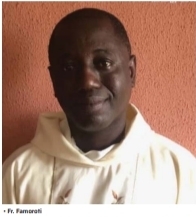Very Rev. Fr. Anthony Famoroti, Chaplain of the Catholic Women Organisation, Nigeria Lagos Ecclesiastical Province (CWONLEP), shares his insights on the way forward for the newly inaugurated executives. The inauguration, held on Sunday, September 28, 2025, was presided over by the Archbishop of Lagos, Most Rev. (Dr.) Alfred Adewale Martins. In this interview with the Editor NETA NWOSU, Fr. Famoroti speaks on expectations for the new leadership, his experience as chaplain, and other issues. Excerpts:
Fr., congratulations on the inauguration of the new Executives of the Catholic Women Organisation, Lagos Ecclesiastical Province (CWONLEP). Where do you see CWONLEP heading with this new inauguration?
I think one of the things I have suggested for CWONLEP is that there should be continuity, and this continuity should be in terms of advancement. We cannot afford to overlook what others have not done well; we need to improve on it. That is how CWONLEP can reach greater heights than others. So, one of the key things is that there should be continuity in terms of progress. You have been in CWONLEP for quite some time now. You started as a Diocesan Chaplain, and now you are a CWONLEP Chaplain.
How would you describe your journey in CWONLEP so far?
It has been very interesting and very fulfilling, especially when I had to start as a Diocesan Chaplain. It was not easy because it takes a lot to understand women. One must have two things: you must listen to them and you must be patient with them. These are the things I have been able to learn from the women. You must allow them to air their views, and after they make their views known, you can then say, “This is the direction we should go.” Do not disregard them. The idea that women are second-class citizens, that women’s voices cannot be heard but they can only be seen, is a thing of the past.
Allow them to air their views, and from there you can take a decision and say, “This is what we should do.” So, for me, it has been an interesting journey—learning to have a listening ear and to be patient when issues are brought up. Even today, there are so many things to appreciate in them. So, I suggest that anybody coming into this apostolate must be able to listen, must be patient, and must appreciate women. Every woman wants to be appreciated. Do not diminish them.

How would you describe the impact CWONLEP has made on women in the Lagos Ecclesiastical Province generally, beyond the CWO?
It has been quite enriching in the sense that they have made a meaningful impact in the lives of women in the province. For example, there is a CWONLEP project that we have at Lala. In that place, they have been able to produce bags and many other things, and they have taught so many people within that locality. That CWONLEP project has helped a lot of people within that vicinity—in terms of enlightenment, in terms of helping them to understand that they can be useful to themselves and useful to society. CWONLEP has a lot to do, especially when you look at the magnitude of work to be done, even with the Lala project. It is a great initiative, and I thank God that, in my discussions with His Grace, he has been very fatherly in supporting the project of CWONLEP. I believe that when the project comes fully into the limelight, it will go a long way to help our women, our mothers, and even men too can learn some of those skills from them. So, it has been quite good in terms of the planning of CWONLEP. We pray that God will grant us the grace and, through the intercession of Our Mother of Good Counsel, we will achieve more progress.
Looking at the current state of the nation, coupled with the hardship, what message do you have for women generally in Nigeria?
Women should always be at the forefront of so many things. I always tell people that women are the ones who care; they are so sensitive. When you look at our nation these days, you see that many women are taking up certain challenges, even in areas that people feel are meant only for men. However, some women look down on themselves. They shouldn’t look down on themselves. They should continue to be at the forefront—whether in the Church, in politics, in society, everywhere. Women should not be silent at any point in time. When we look at our government in Nigeria today, you see the number of women in government compared to men.
I think it should have been at least 70 percent men and 30 percent women. But what we are having is almost 90 percent men and maybe just 10 or 5 percent women. I think the equation is not balanced. When we get women more involved, there will be hope for the nation, there will be hope for the family, because women will never close their eyes whenever things are not going right. I have had experiences with my women in the CWO. When things are not going well, you see these women—they will never keep quiet.
They want things to be done in such a way that everybody will be happy at the end. For example, we just had this inauguration. I know what I went through: people calling me, “Fr., how do we do it? How do we go about it?” It is not that they are perfectionists, but they want things to be done well. So, for me, I suggest that it is high time we allow our women to take up certain responsibilities within and outside the Church. It will help our nation and all of us as a whole. That is my view.





